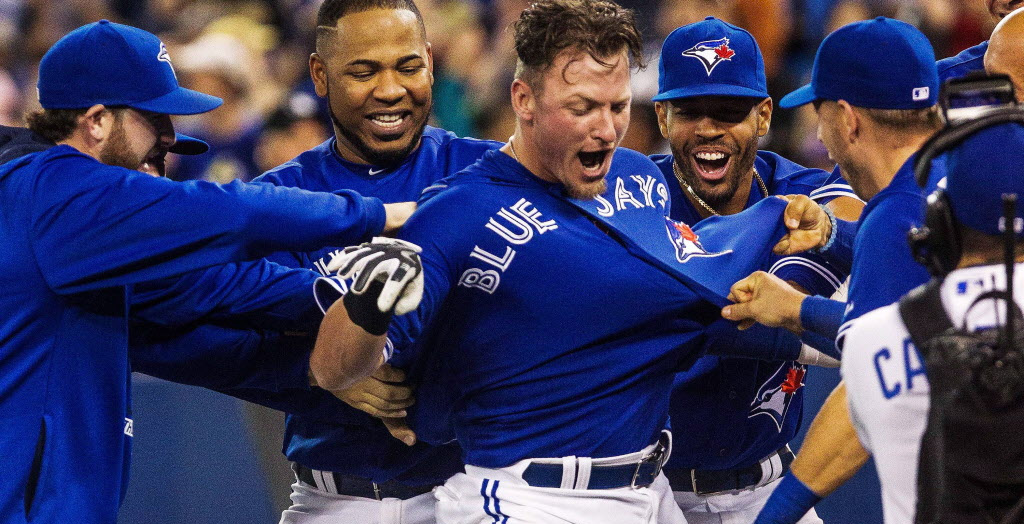How I Learned to Stop Worrying and Love the Blue Jays
Already, from the distance of a few short months, the final moments of the Blue Jays 2015 season have a gauzy, dreamlike quality. Did that insane seventh inning really happen? What was the precise sequence of those series-ending Texas errors again? And how in God’s name did infielder Cliff Pennington pitch an inning of playoff baseball?
For most of last year, my hopes for the Jays were sensibly modest. After decades of mediocrity, I only wanted one thing: meaningful baseball, the chance to watch a game with consequences in the heightened atmosphere of a post-Labour Day weekend. But as the team played its way through the end of the season, performing unlikely feats of heroism, a strange kind of mania took hold. Meaningful baseball didn’t just arrive, it eclipsed everything else. Like children given sugar for the first time, Toronto sports fans reacted to winning with unrestrained giddiness. For weeks at a time, I woke up thinking about the Jays, rearranged my schedule to make sure I didn’t miss games, clicked on even the most trivial articles (“Encarnacion does Edwing celebration for fun, not superstition”) to find the smallest scrap of Jays news.
I watched that final game in a bar with a group of friends that had grown, game after game. When that final at-bat came — our MVP Josh Donaldson stepping to the plate and then weakly grounding out — we clutched our hands to our faces in pain. The loss felt like going through the Kubler-Ross stages of grief in fast forward. The anger (that stolen home run by the neck-bearded fan!), the disbelief that the season was over, the sadness over all the missed opportunities, and then, very quickly, a feeling of gratitude. You were thankful that a dumb sports team, of all things, was able to make you feel so much.
When it was all done, we stumbled out into the street, dazed and punch-drunk from an excess of emotion. It was like emerging from an absorbing matinee movie into a too-bright afternoon. You blink at the world around you, mentally adjusting to the world as it is after so much time spent in pleasant make believe. The entire Blue Jays season — the home runs and bat flips, the feeling of genuine comradery between strangers in a city where polite tolerance is generally the norm — all that was over. Out on the street, it took a moment to become re-acquainted with the reality of life on a slightly less exalted plane.
•••
TODAY, with the perspective of an offseason, it’s obvious that the magic of last year’s team wasn’t just because of the winning. It was an alchemy of elements that come together once a generation, if you’re lucky: the length of the playoff drought in a city of consistently miserable sports teams; the assortment of genuinely likeable characters; that very specific rush that comes when a good team decides to try to become great and then, miraculously, becomes so much better than anyone could have imagined. In the midst of that kind of season, even the most cynical sports fan could buy into the focus-grouped, PR-created slogan of a cable conglomerate. For a second, “come together” felt like a genuine rallying cry.
You were thankful that a dumb sports team, of all things, was able to make you feel so much.
The offseason, of course, quickly reminded us that these kinds of stories are all pleasant fictions. Baseball is a business, obviously. David Price went to the team that paid him, as we all knew he would. On a cold day in January, Munenori Kawasaki, a cult hero and terrible hitter who had been one of the team’s few bright spots in less fortunate times, quietly left for Chicago. Allowing General Manager Alex Anthopoulos, the man who created this particular group, to walk away felt like the clearest possible way to disabuse fans of the notion that there was anything especially familial about the 2015 Jays.
And so, after the highs of the fall and the sobering winter season, the return of the Blue Jays this month comes with a raft of complicated emotions.
In past years, opening days have all had a familiar quality. The return of baseball feels like the first day of school. You see who has changed, figure out how you feel about the new kids, become reacquainted with people you hadn’t even realized you’d missed. There is a sense of optimism. In the blank slate of a baseball-less winter, you can just about convince yourself that that middling free-agent could develop into a slugger, that the struggling pitcher might find his groove, that your team has a chance.
The average baseball season is a series of moderate gratifications punctuated by rare moments of high drama. A few years ago, sitting in the 500 level at the Rogers Centre on a weeknight could feel almost meditative. You admired the pitching battles. You observed the batter in the on-deck circle trying to catch the timing of the pitcher, cheered at an athletic play or home run. The pleasures of the game were decidedly low-key. All sports have “seasons,” but baseball feels like the one sport that deserves the term: for months at a time, day after day, baseball is simply there, like Law & Order reruns.
This year is different. Those mild hopes have been replaced by serious expectations. Because, it turns out, last year’s decision to go all-in wasn’t just an organizational move. Toronto sports fans, hardened by decades of disappointment, generally love their teams defensively, guarding their hearts. Last season, we bought in and decided to put our emotions on the line.
On a Monday afternoon this April, then, we’ll greet a team full of familiar faces that, if all goes as it should, will play fun, competitive baseball in a tough division. We’ll shower José Bautista with applause, hoping that his 2015 heroics won’t be his last playoff at-bats with the Jays. We’ll chant MVP at Donaldson, smile at Marcus Stroman and Aaron Sanchez’s bro-mance. And we’ll do it all with a new feeling, our gratitude tempered with a kind of anticipatory anxiety — the excitement tinged with apprehension, the pure joy of winning shading into a fear of losing, each pitch feeling that tiny bit more consequential. It’s all unfamiliar and strangely emotional and, in the end, totally welcome. At last, meaningful baseball.










